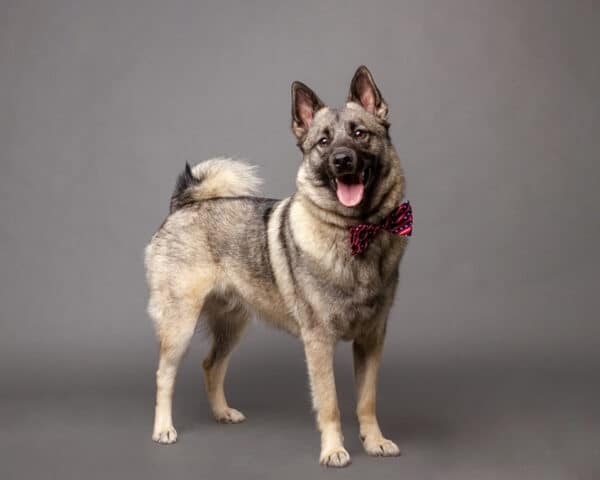Strong and stout, the French Bulldog captivates his family with animated playtimes, fanciful frolics, and, yes, bountiful snuffles, too. A relatively easy keeper, the Frenchie has small exercise and grooming requirements, but big companionship needs. This isn’t the breed for people looking for a dog with all-day energy or a protective attitude (Frenchies likely sleep through doorbells), but the breed makes a charming, low-maintenance family friend.

Frenchie facts
- Weight: Under 28 pounds
- Life span: 10 to 12 years
- Coat: The coat is short and smooth. The Frenchie’s skin is soft, loose, and wrinkled.
- Color: White, cream, fawn, or any combination of those. Markings and patterns include brindle, piebald, black masks, black shadings, and white markings.
- Colorful controversy: Rare “fad” colors often come with health issues; families looking for healthy Frenchies do well to work with professional breeders adhering to AKC
breed standards. - Grooming: An occasional bath and a weekly brushing suffice. Wrinkles should be cleaned regularly since bacteria can hide in the folds.
- Shedding: Yes, moderate shedders
- Ears: The Frenchie is credited with bat ears, broad at the base, elongated, with round tops.
celebrated underbite: The underjaw is deep, undershot, square, and turned up. - Heat tolerance: Sensitive to cold and heat, too, the French Bulldog doesn’t tolerate extreme weather conditions. He needs indoor living with A/C in the summer and heat in the winter.
- Equipment: Fences around any pool area and life jackets for water play; Frenchies don’t swim well, if at all. Hypoallergenic shampoo to help avoid allergic reactions or skin sensitivity. Cooling mats or extra fans in summer.
- Possible health issues: Anesthesia is riskier with Frenchies, so families need to find a vet with experience handling brachycephalics. Most Frenchie pups (with their large and broad heads) are delivered via cesarean section.

The French Bulldog’s rich (and slightly risqué!) history
The English Bulldog provided the breeding foundation for today’s Frenchie. Over time, some British breeders developed smaller, lighter Bulldogs with an extra dose of vivacity. When English lace makers moved to France, they took their popular, lighter Bulldogs with them. These Frenchie forefathers became the darlings of ordinary Frenchmen, including Parisian streetwalkers. Americans visiting France became enamored with the breed, too, and introduced the dogs to the states. Especially fond of the bat-ear style, Americans wrote the breed standard to include bat-style ears. These days, Frenchies are the fourth most popular breed in America.

No triathletes here
Teaching a Frenchie takes patience; they’re agreeable but stubborn. Training a Frenchie in obedience takes determination as well as a sense of humor. Frenchies want to please their owners, but they also want to please themselves. If the two interests don’t coincide, Frenchies may choose to suit themselves! If you’ll be humiliated if your dog dozes off in class, you should rethink Frenchie ownership.
Although Frenchies appreciate walks and playtimes, they don’t tolerate strenuous exercise. Frenchies are brachycephalic: Their short faces make breathing less efficient than longer-muzzled dogs. They’ll have trouble cooling themselves off in hot weather and after vigorous workouts.
Car travel with the easygoing Frenchie is usually stress-free, as long as he’s kept cool. For airline travel, keep in mind that some airlines have concerns flying brachycephalic breeds in cargo. Short-nosed breeds are especially vulnerable to air quality and temperature changes.
Frenchies usually get along well with other animals and treat strangers amiably. A relatively quiet breed, few Frenchies bother to bark at newcomers. Instead, they’re inclined to greet them with slobbers and kisses. Their families won’t hear much barking, but they’ll certainly hear snorting and snoring galore.
Featured Image Credit: MirasWonderland | Getty Images






